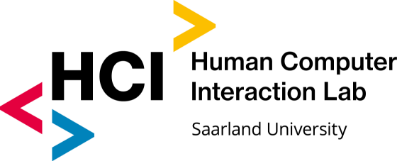Seminar: Physical Computing / Summer term 2021
| Type | Seminar (7CP) | |
| Time | Wednesdays (16.00-18.00) , (Kick-off, 14th of April ). | |
| Place | Remote | |
| Language | English | |
| Links | Moodle |
Description
An important commonality of today’s cutting-edge user interfaces is that they are much more physical than their predecessors. No matter if we interact using our bodies in Augmented or Virtual Reality, if we use gestures to interact in Smart Rooms or with Internet-of-Things (IoT) devices, or if we communicate using high-tech fashionable Wearables: physicality is key! Instead of using a conventional touch-screen, these interfaces build on the rich capabilities of how we humans interact and communicate.
The goal of this seminar is to acquire basic conceptual and practical skills in developing physical user interfaces. The seminar will cover the following topics:
- Conceptual basics of ubiquitous computing, tangible interaction, embodied interaction
- Basic electronics and microcontroller programming (Arduino)
- Prototyping and digital fabrication (3D printing, milling, and cutting)
- Applied machine learning
- Development of applications based on learned technologies
Activities
This seminar has been designed to learn conceptual and technical foundations of Physical Computing by doing. A hands-on project involves explorations and implementation in different avenues, notably rapid prototyping with electronics and applied machine learning algorithms to build interactive applications. As a part of the seminar, students will work on a project in a team. We will present a list of potential project topics in the first week. Students can choose from these or propose their own ideas for projects.
The seminar will also involve three reading activities, done individually by each student. For every reading activity, you will have to read one or more research papers and hand in a written report that discusses these papers. Reports should summarise the key aspects, and more importantly, should include original and critical thought that shows you have acquired a meta-level understanding of the topic.
Some examples of successful (even Award-winning) projects from previous versions of this course include Interactive Jacket for Cyclists, Interactive Dancing Socks, Ambient Flower, Sprinter
Covid-19
Due to the ongoing pandemic, the seminar will majorly take place remotely. However, due to the use of hardware, purely remote/online participation is not possible. The plenary meetings will take place remotely. Individual group meetings will be held on-site or remotely, depending on the current project phase, the team’s preferences, and the university guidelines as updated here .
Prerequisites
- This is a Master-level seminar, which can also be taken by Bachelor students from the 5th study semester and above.
- Moderate to high-level programming experience with Python and basic calculus is necessary to complete machine learning related tasks.
- Knowledge in hardware programming (e.g., some experience with Arduino) will help make physical prototypes but is not a hard requirement.
Registration
Please note that because of the close individual supervision the number of participants is limited to 10.
Please register through the seminar portal offered by the computer science department:
https://seminars.cs.uni-saarland.de/seminars21 .
- A brief statement about your motivation for attending this seminar and details on your programming experience, including what project(s) you have already implemented.
- Please indicate your study program, your semester of study as well as the classes you have already taken in the field of Human-Computer Interaction.
- If you would like to team up with a specific student, please indicate the person(s) name(s).
Literature and Materials
All the reading material and resources will be made available on Moodle.


